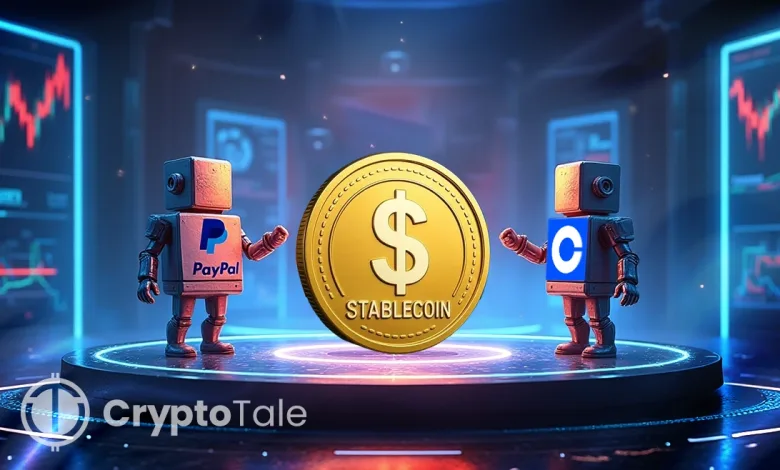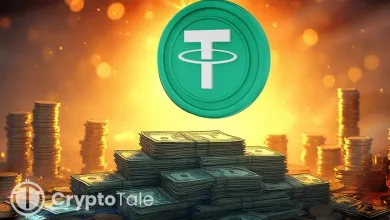Coinbase and PayPal Navigate GENIUS Act With “Reward” Loophole on Stablecoins

- Coinbase and PayPal offer stablecoin rewards by avoiding issuer classification.
- GENIUS Act bans yield by issuers, but rewards by platforms remain untouched.
- Non-issuer status opens new paths for legal stablecoin innovation in the U.S.
Coinbase and PayPal have affirmed their commitment to offering rewards on stablecoin deposits, despite new federal restrictions. The recently passed GENIUS Act prohibits stablecoin issuers from providing users with passive yield or interest. Both firms emphasized that they are not stablecoin issuers and are therefore not subject to the Act’s core limitations. Instead, the companies have structured their offerings as “rewards programs,” maintaining customer incentives without direct regulatory conflict.
Coinbase continues to offer a 4.1% annual return on USDC holdings to eligible U.S. customers. Similarly, PayPal offers a 3.7% annual return on deposits in its native stablecoin PYUSD. These reward programs are presented as benefits for holding funds on their platforms. Executives maintain that these are not traditional interest-bearing instruments, avoiding regulatory triggers defined under the GENIUS Act.
The GENIUS Act was framed to categorize the stablecoins as tools that emphasize payments but not investment. Legislators were concerned by the issuers who sold products similar to those of the banks with no controls. Nonetheless, the strategy used by Coinbase and PayPal seems to be suitable as both transfer the incentive role to non-issuer platforms. This strategy creates a regulatory gap between stablecoin creation and platform-level financial benefits.
Rewards, Not Yield: Structuring Within Legal Boundaries
Coinbase no longer plays an issuing role in the USDC ecosystem. USDC is now fully managed and issued by Circle, which does not pay rewards directly. Although Coinbase co-founded USDC with Circle, it exited its issuer role in 2023. This allows Coinbase to offer competitive rewards without violating provisions that apply to issuers under the new law.
During its earnings call, Coinbase CEO Brian Armstrong clarified the firm’s compliance stance. Armstrong emphasized that Coinbase does not pay yield or interest, only customer rewards. He described the reward program as a key differentiator that encourages users to store stablecoins on Coinbase.
Similar is the case with PayPal. PYUSD is issued by a regulated third party, Paxos, and not by PayPal. Because of this, it is not directly classified as a stablecoin issuer.
Implications for U.S. Stablecoin Innovation
Coinbase and PayPal responses may be an indication of what lies ahead in the US as far as stablecoin innovation is concerned. Since the law has limited the existence of direct yield offerings, companies might adopt more incentive arrangements. The repackaging of interest to rewards can turn into a mainstream compliance tool. According to this approach, platforms can maintain the customer benefits without inducing issuer-based limitations.
The GENIUS Act’s focus on issuers creates a narrow regulatory scope. Lawmakers have yet to address the broader implications of rewards provided by non-issuers. A Senate staffer noted that the Act was not intended to govern stablecoin activity on secondary platforms. As such, companies operating in adjacent roles may continue to develop financial products that resemble yield offerings.
Related: Coinbase Lists ResearchCoin: Is DeSci the Next Frontier in Crypto Utility?
These developments also reflect ongoing tensions in digital asset regulation. The U.S. aims to support payment innovation while preventing crypto products from functioning as unregulated investments. This evolving framework may shape how future stablecoin products are designed and marketed.
James Alexander Chriss, the CEO of PayPal, reaffirmed the reward-oriented philosophy of the firm. The reason he has cited is that the program was important in the attraction and retention of customers. Coinbase executives also expressed strong confidence during recent earnings calls, emphasizing the growth potential of USDC and the resilience of their reward-based model amid new regulations. The national stablecoin world will continue to change, especially as companies and jurisdictions explore the boundaries of the new legislation.




